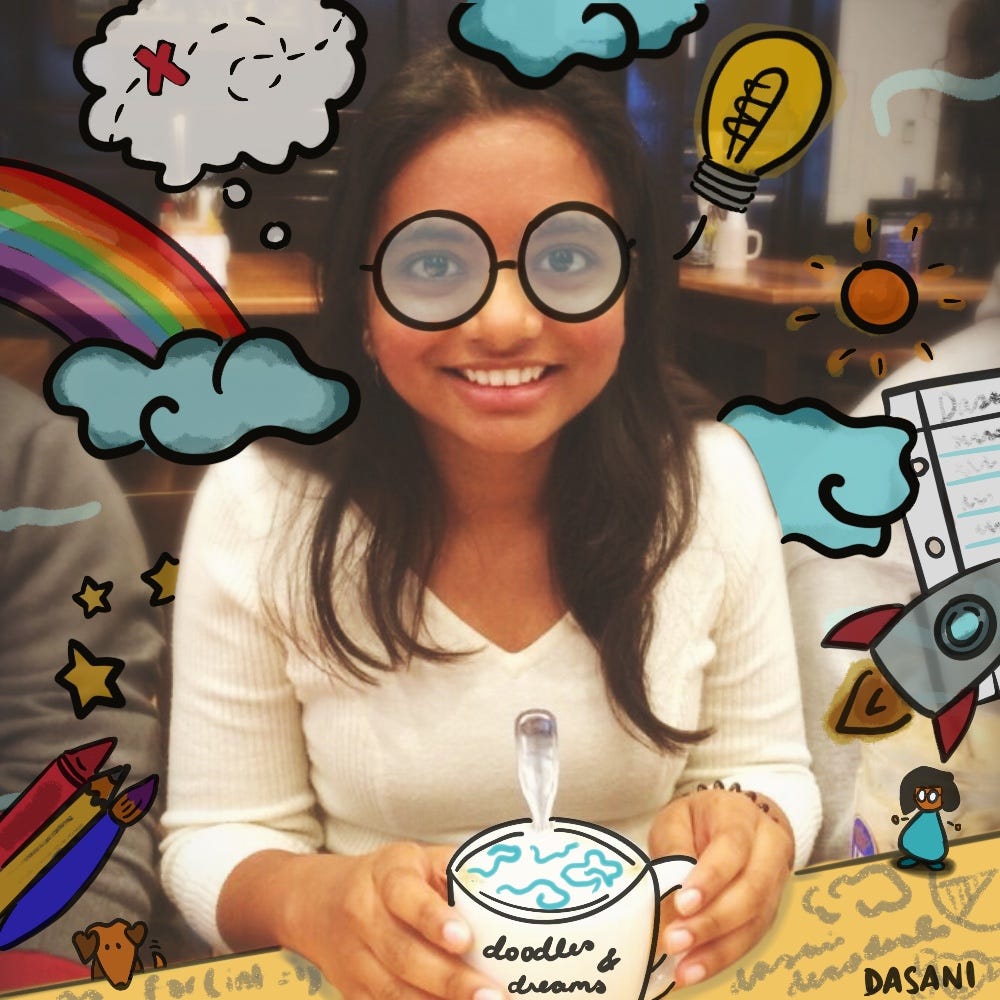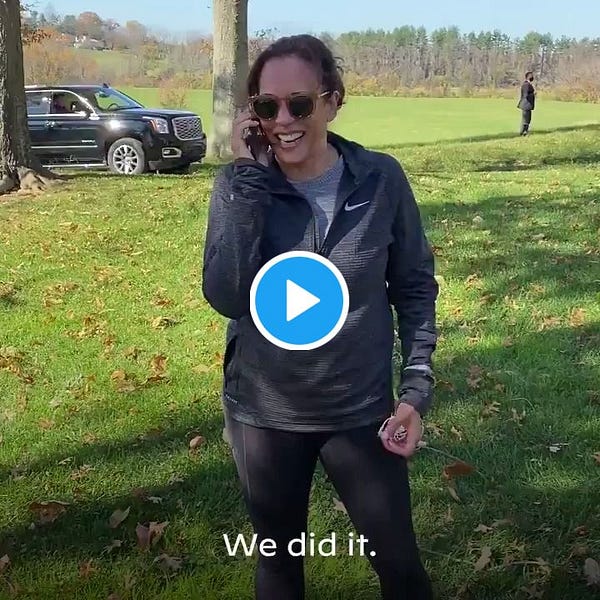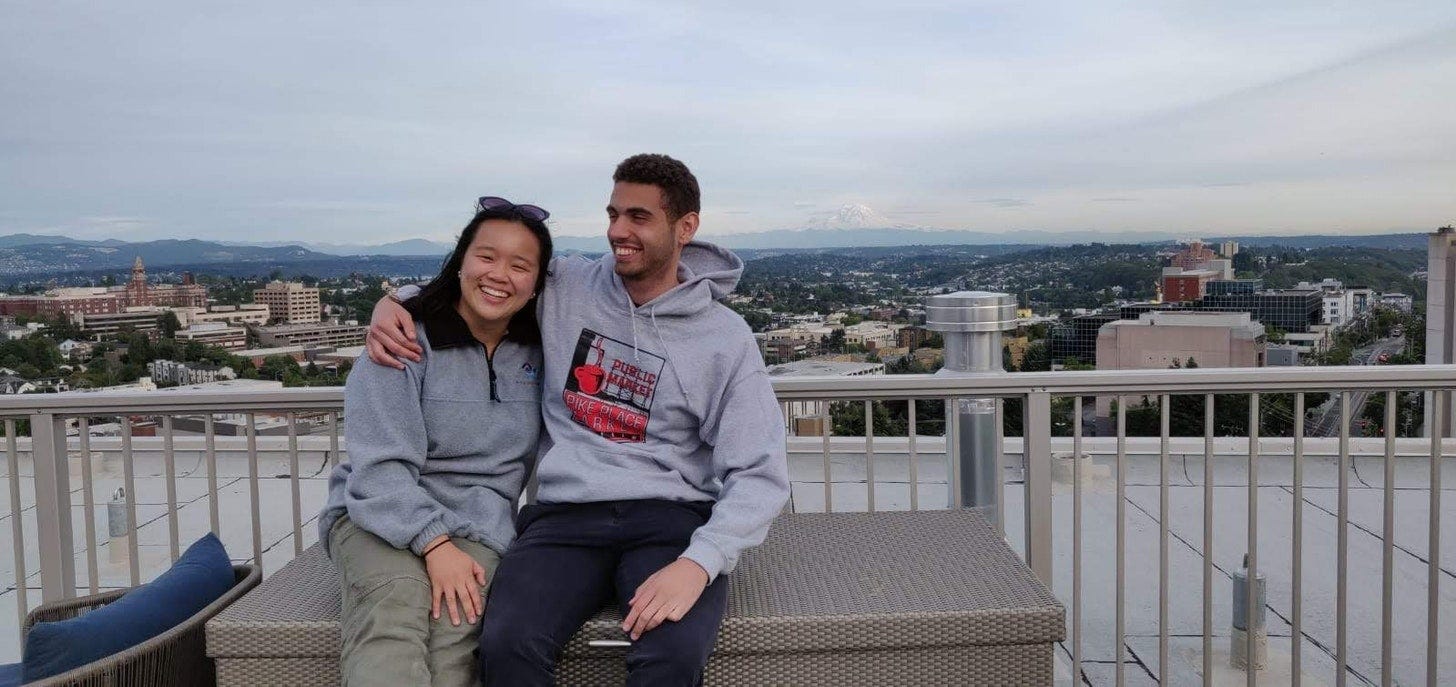APM Map 🗺️ Issue #8: On Tackling the Technical Interview
APM Map Interview Prep mini-series - Technical Interviews (Part 4 of 4)
APM Map 🗺️ is your one-stop destination for navigating your APM recruiting journey. The site is *live* at apmmap.co, and the APM Map newsletter will run weekly this fall, spotlighting incredible APM recruiting resources & mentors along the way.
In today’s issue:
🧘🏻♀️ Mindfulness by Mima: On systemic change (& system design interviews)
🗺️ The Journey: Interview Prep > Technical Interviews
Mima’s Philosophy
Featured Resources
🌏 Community Partner: Daily Product Prep
👩🏻💻 APM Map Mentor Spotlight: Dasani Madipalli
Hey friends - hope you have been taking lots of care ❤️
This week has been me simultaneously holding my breath, breathing a sigh of relief, and a breath of fresh air. In many ways, this week, election, and year have really just shown me that we are only at the beginning: the real work starts now.
I thought it was really fitting that today, as I’m covering how to tackle technical interviews a.k.a system design interviews, I’m thinking about systemic change & how we can design systems that promote racial, environmental, & economic justice. As a woman in tech & product, I’m also asking myself if & how we can build and design products that care — for ourselves, our communities, and our structures and systems at-large. I definitely don’t have all of the answers, but as with building any product, asking the right questions is equally, if not more important, than having all the right answers.
However, one thing is clear: when you design systems, you must think about your users. When making tradeoffs for your system, how is it impacting your users? Systems — both technical and structural — can fail at any time: do you have a backup plan for if your system fails? How do you protect your most vulnerable users from security threats (or in cases of structural systems, from racism, sexism, income inequality, & xenophobia?).
I hope that the above illustrates that many of the questions you might ask yourself in a System Design interview can also apply to frameworks of structural care. And I hope that this knowledge empowers you to not only ace your next System Design interview, but to also use your System Design skills to design systems that care ❤️
If you want to chat more about designing systems that care, or need a pep talk before that big upcoming interview, DM me on Twitter!
🗺️ The Journey: Interview Prep > Technical Interviews
Since everyone is at different stages of the interview process, if you need an overview of all types of interviews, you can check out APM Map’s Roadmap to Recruiting 🚗 or the 180+ resources we have up on the APM Map directory.
💡 Mima’s Philosophy
Put your users first. As a PM, your job is not to be the Principal System Architect, and design complex systems from scratch. Your job is to advocate for the users that will be impacted by the system, and make sure that, by thoroughly thinking through all possible use cases, your users’ voices are heard. For example, if you’re building a platform for online gaming, you should probably optimize for low latency. If the games on your platform are laggy (i.e. high latency), your users likely won’t be very happy and will probably stop using your platform.
Always include tradeoffs. In addition to putting your users first, as the PM, you want to think through every possible use case, and account for any and all tradeoffs that occur when picking a certain design. This will not only demonstrate your technical chops, but also your critical thinking skills - crucial for any PM.
📚 Featured Resources
Want to learn Technical Concepts from a Product Manager perspective? APM Map Mentor David Cai is the founder of PM Tech Lessons, and this resource is phenomenal. Check out:
PMTL’s Algorithm Interview Prep course if you’re a non-technical/CS major
PMTL’s Technical Explainers for high-level overviews of technical concepts (and subscribe to the newsletter to get these in your inbox every week!)
Jeff, the technical co-creator behind APM Map 🎉 , recently did an interview with PMTL about building APM Map — check it out! (and here’s the transcript)
Wondering how you should talk about a technical project? Since this is a PM interview (and not a SWE interview), make sure you stress the high-level technical decisions you made while working on a project (i.e. why you chose to use X over Y, and how it impacted your results).
What counts as a technical project:
If you’re a CS major, you can definitely workshop a final project you did for a class. Try to tie in some metric that you improved over the course of your project (i.e. improved accuracy rate by X%)
If you’ve interned as a SWE, using your intern project here is also a great idea. It not only shows that you know how software works IRL, but that you understand how to work with Engineers (which is, basically 75% of what you do as a PM)
If you’ve built technical side projects (i.e. following coding tutorials, at hackathons, etc.), this is also a great thing to share. It not only demonstrates your technical capabilities, but that you have entrepreneurial drive — both core traits of a good PM!
How do you frame your technical project from the lens of a PM? Last year, I used my CS capstone project when asked about a technical project I worked on. I followed the structure below pretty closely — and made sure to highlight the results of the two models I tested (a.k.a. pointing to some metric that my technical considerations impacted/improved)
Want to get an overview of how to approach the System Design Interview? I could not recommend the Success in Tech YouTube channel more (something our incredible APM Map Mentor Roshni Rawal shared with me back when we were bbs doing mock interviews). I highly recommend watching the following videos to learn how to structure your system design interviews: How to Design Whatsapp & How to Design Twitter!
Note: Although it may vary from company to company, most APM interview loops with technical rounds are almost always going to be System Design interviews, not coding interviews. With this being said, if you don’t have clear technical experience on your resume, your technical round may look a little different and you’ll definitely want to check in with your recruiter for more information.
Have you done some System Design questions, and want to take your skills to the next level? Check out Chapter 9 of Cracking the Coding Interview on System Design, which will explain how you can incorporate key concepts into your answers like horizontal & vertical scaling, using load balancers etc. into your answers. At the end of the chapter, you can also try tackling some of the practice System Design questions listed!
🌏 Community Partner: Daily Product Prep
Each week, this section will be dedicated to spotlighting one of our awesome community partners. Our goal is to bring you as many freebies, discounts, & more to make the interview prep process more equitable & financially accessible. This week, we’re excited to feature Daily Product Prep!
What is Daily Product Prep? Daily Product Prep sends you one PM interview problem to solve every day, so you can build a good habit of practicing your PM interviewing skills.
Learn frameworks to answer "improve a product", "design a product", "diagnose a drop", and more product manager interview questions from product managers that have gotten offers from Facebook, Google, Amazon, and other Silicon Valley startups.
See upvoted product solutions from other product managers, discuss product questions with other users, and be part of a community.
Want to try out Daily Product Prep premium membership and get detailed answers for each problem? Use promo code apmmap20 or use this link to get a 20% discount on their premium plan!
👩🏻💻 APM Map Mentor Spotlight
Each week, this section will be dedicated to spotlighting the awesome work that our APM Map mentors are doing. This week, we’re so excited to feature Dasani Madipalli ❤️
Meet Dasani Madipalli, PM @ Microsoft & Founder @ Dasani Decoded
Curious about Dasani’s Path to PM? Check out Dasani’s article on being a new grad PM to learn more!
Wondering what Dasani is thinking about next? Dasani wants to continue to engage with the early career and student community through her content, coaching and speaking engagement and grow her career as a PM! Check out her website and coaching services @ Dasani Decoded to learn more about how she can help you.
Think Dasani is as incredible as we do and want to stay in touch? Stay tuned with her through her social media and mailing list.
Here’s to finding your own path ✨
Jeff & Michelle @ APM Map
P.S. and if you haven’t already, here’s to getting that phone call you’ve been dreaming of soon ❤️
🗺️ If you’re loving APM Map and want to support us, please feel free to share the website (apmmap.co) and/or this newsletter, or buy us a coffee. If you have any questions about APM Map or APM Recruiting, DM Michelle on Twitter!
Hey! We’re Jeff & Michelle — the creators behind APM Map, and we’re rooting for you this recruiting season. If you want to check out our other side projects, Jeff writes about navigating life as a first-gen college graduate @ Second Gen & Michelle writes about the intersection of tech + self care / community care / structural care @ Tech Care. Thanks for joining us on our journey :’)










